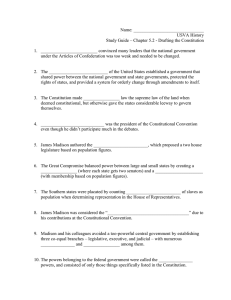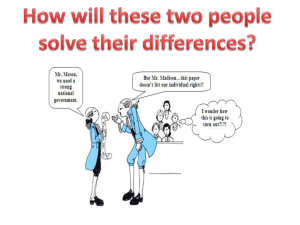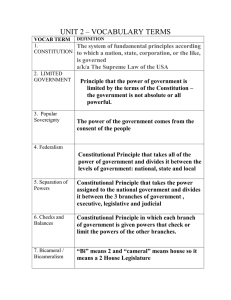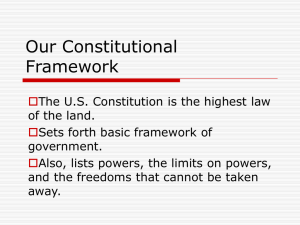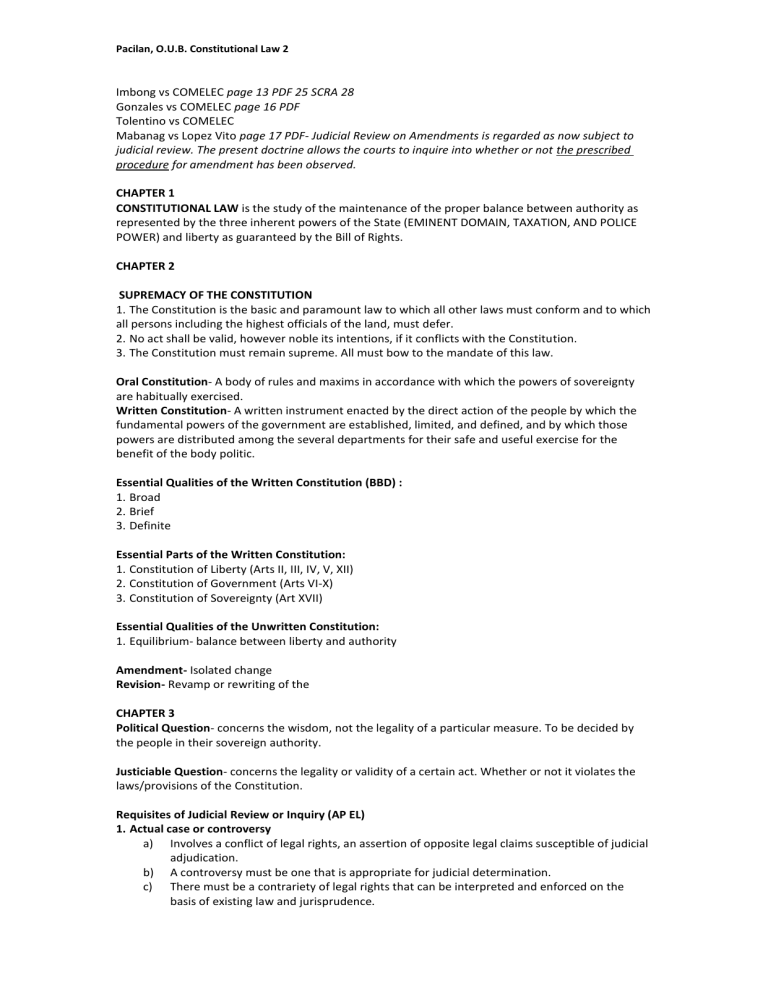
Pacilan, O.U.B. Constitutional Law 2 Imbong vs COMELEC page 13 PDF 25 SCRA 28 Gonzales vs COMELEC page 16 PDF Tolentino vs COMELEC Mabanag vs Lopez Vito page 17 PDF- Judicial Review on Amendments is regarded as now subject to judicial review. The present doctrine allows the courts to inquire into whether or not the prescribed procedure for amendment has been observed. CHAPTER 1 CONSTITUTIONAL LAW is the study of the maintenance of the proper balance between authority as represented by the three inherent powers of the State (EMINENT DOMAIN, TAXATION, AND POLICE POWER) and liberty as guaranteed by the Bill of Rights. CHAPTER 2 SUPREMACY OF THE CONSTITUTION 1. The Constitution is the basic and paramount law to which all other laws must conform and to which all persons including the highest officials of the land, must defer. 2. No act shall be valid, however noble its intentions, if it conflicts with the Constitution. 3. The Constitution must remain supreme. All must bow to the mandate of this law. Oral Constitution- A body of rules and maxims in accordance with which the powers of sovereignty are habitually exercised. Written Constitution- A written instrument enacted by the direct action of the people by which the fundamental powers of the government are established, limited, and defined, and by which those powers are distributed among the several departments for their safe and useful exercise for the benefit of the body politic. Essential Qualities of the Written Constitution (BBD) : 1. Broad 2. Brief 3. Definite Essential Parts of the Written Constitution: 1. Constitution of Liberty (Arts II, III, IV, V, XII) 2. Constitution of Government (Arts VI-X) 3. Constitution of Sovereignty (Art XVII) Essential Qualities of the Unwritten Constitution: 1. Equilibrium- balance between liberty and authority Amendment- Isolated change Revision- Revamp or rewriting of the CHAPTER 3 Political Question- concerns the wisdom, not the legality of a particular measure. To be decided by the people in their sovereign authority. Justiciable Question- concerns the legality or validity of a certain act. Whether or not it violates the laws/provisions of the Constitution. Requisites of Judicial Review or Inquiry (AP EL) 1. Actual case or controversy a) Involves a conflict of legal rights, an assertion of opposite legal claims susceptible of judicial adjudication. b) A controversy must be one that is appropriate for judicial determination. c) There must be a contrariety of legal rights that can be interpreted and enforced on the basis of existing law and jurisprudence. Pacilan, O.U.B. Constitutional Law 2 2. The question of constitutionality must be raised by the proper party a) A proper party is one who has sustained or is in immediate danger of sustaining an injury as a result of the act complained of i. Tolentino vs COMELEC- a senator had the proper party personality to seek the prohibition of a plebiscite for the ratification of a proposed constitutional amendment. ii. Oposa vs Factoran- Petitioners minors assert that they represent their generation as well as generations yet unborn. Their personality to sue on behalf of succeeding generation can only be based on the personality concept of inter-generational responsibility insofar as the right to a balanced and healthful ecology is concerned. 3. Constitutional question must be raised at the earliest possible opportunity a) General rule: if it is not raised in the pleadings, it cannot be considered at the trial, and if not considered at the trial, it cannot be considered on appeal. XPN (Exception): i. In criminal cases, the constitutional question can be raised at any time in the discretion of the court. ii. In civil cases, the constitutional question can be raised at any stage if it is necessary to the determination of the case itself. iii. In every case, the constitutional question can be raised at any stage if it involves the jurisdiction of the court. 4. Lis mota of the case/ the decision of the constitutional question must be necessary to the determination of the case itself. a) the Court will not pass upon a constitutional question although properly presented by the record if the case can be disposed of on some other ground such as the application of a statute of general law (Laurel v. Garcia) b) for reason of public policy, the constitutionality of a law cannot be collaterally attacked (PNB v. Palma) c) As a rule, the matter of constitutionality shall be considered if it is the lis mota of the case and argued at the earliest opportunity. Effect of Declaration of Unconstitutionality 1. Orthodox View a) An unconstitutional act is not a law; it confers no rights; it imposes no duties; it affords no protection; it creates no office; it is in legal contemplation, inoperative, as if it had not been passed. (Norton v. Shelby County). This view is expressed in Article 7 of the NCC “when the courts declare a law to be inconsistent with the Constitution, the former shall be void and the latter shall govern.” 2. Modern View a) The court in passing upon the question of constitutionality does not annul or repeal a statute, it simply refuses to recognize it and determines the rights of the parties just as if such statute has no existence. General Rule: An unconstitutional law is void. It produces no rights, imposes no duties and affords no protection. It has no legal effect. It is, in legal contemplation, inoperative as if it has not been passed. XPN: Doctrine of Operative Fact I. The law is recognized as unconstitutional but the effects of the unconstitutional law, prior to its declaration of nullity, may be left undisturbed. Partial Unconstitutionality Courts hesitate to declare a law totally unconstitutional and, as long as possible, will salvage the valid portions thereof in order to give effect to the legislative will. Requisites: 1. Legislature is willing to retain the valid portions even if the rest of the statute is declared illegal (separability clause). 2. The valid portions can stand independently as a separate statute . Pacilan, O.U.B. Constitutional Law 2 Positions of the Constitution Convention (on the relative position of the constitutional convention vis-a-vis the regular departments of the government) 1. Theory of Conventional Sovereignty a) The constitutional convention is supreme over the other departments of the government because the powers it exercises are in the nature of sovereign powers (Loomis v. Jackson) 2. Wood’s Appeal a) Considers the constitutional convention inferior to the other departments of the government since it is merely a creation of the legislature 3. Frantz v. Autry a) Declares that as long as it exists and confines itself within the sphere of its jurisdiction the constitutional convention must be considered independent and co-equal with the other departments of the government JUDICIAL REVIEW OF AMENDMENTS - The question of the validity of the adoption of amendments to the Constitution is regarded now as subject to judicial review - The judiciary may declare invalid a proposal adopted by less than ¾ of the members of the Congress, or a call for a constitutional convention by less than 2/3 of the legislature, or a ratification made by less than a majority of the votes cast, or a plebiscite irregularly held Procedure 2 Steps 1. Proposal a) Section 1, Section 2, and Section 3 of Article 17 2. Ratification a) Section 4 of Article 17.




